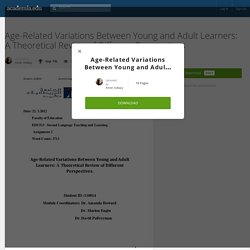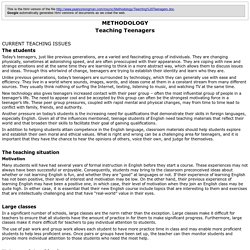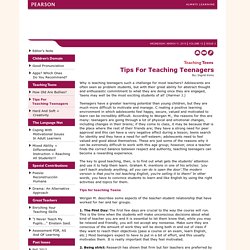

50 000+ Free ESL, EFL worksheets made by teachers for teachers. How to Get Students to Work Harder. Over the past five years, more than $200 million has gone toward launching the new Common Core standards, with the goal of closing achievement gaps in public schools.

But for all their meticulous detail about math and language curricula, the standards fail to address one important factor: the psychological barriers that stand between many students and deeper learning. Unless students are motivated to take on the new standards, and persuaded that they’re up to the challenge, the Common Core could have the unintended effect of leaving many students even further behind. Researchers like Stanford psychology professor Carol Dweck—best known for her 2006 book Mindset—have been gathering insights into student motivation for three decades. New work by her colleagues makes a strong case for focusing on students’ perceptions of themselves. The good news is that students can be buttressed psychologically to tackle academic challenges. The results were striking. Age-Related Variations Between Young and Adult Learners: A Theoretical Review of Different Perspectives.
Student: 110014 Second Language Learning and Teaching Module code: EDU5134 A: The biological factor: Is language acquisition biologically determined?

Is there an optimal age for languageacquisition? Penfield and Roberts (1959) argued that children could recover language functionsafter injury in the speech areas while adults rarely did so. Jeff Stranks Teaching Teenagers Tip #2: Drawing Attention to Lexis. What are the best ways to memorise new vocabulary? Getting Students to Stick to English During the Lessons: Herbert Puchta (Teaching Teenagers Tip #3) Getting Students to Listen in a More Focused Way: Herbert Puchta (Teaching Teenagers Tip #2) Top 10 Proven Classroom Management Tips for Teachers.
The%2016%20Proactive%20Classroom%20Management%20Skills.pdf. Top Tips for Successful Classroom Discipline and Management. 5.

Be Fair and Consistent Students have a distinct sense of what is and what is not fair. Teachers must treat all students with respect and treat all students equitably. One of the worst things that can happen in the classroom is the student(s)'s perception that the rules are not enforced fairly or consistently. There is a case to be made for differentiated discipline, however. Bear in mind that zero tolerance policies have proven to be a failed experiment. Moreover, educators should not assume that because a student has disrupted a class everyday for a week, she will disrupt it again today. It is also important to provide students with specific feedback about their behaviors and social skills, especially after an incident. Smart Classroom Management. Teaching%2520Teenagers. MethodologY Teaching Teenagers Current Teaching Issues The students Today’s teenagers, just like previous generations, are a varied and fascinating group of individuals.

They are changing physically, sometimes at astonishing speed, and are often preoccupied with their appearance. Unlike previous generations, today’s teenagers are surrounded by technology, which they can generally use with ease and efficiency. New technology also gives teenagers increased contact with their peer group – often the most influential group of people in a teenager’s life. Another pressure on today’s students is the increasing need for qualifications that demonstrate their skills in foreign languages, especially English. In addition to helping students attain competence in the English language, classroom materials should help students explore and establish their own moral and ethical values.
The teaching situation Motivation Large classes Not enough teaching hours Monitoring progress Learning differences 1 Motivate. Tips For Teaching Teenagers. Why is teaching teenagers such a challenge for most teachers?

Adolescents are often seen as problem students, but with their great ability for abstract thought and enthusiastic commitment to what they are doing once they are engaged, ‘teens may well be the most exciting students of all’ (Harmer J.) Teenagers have a greater learning potential than young children, but they are much more difficult to motivate and manage. C reating a positive learning environment in which adolescents feel happy, secure, valued and motivated to learn can be incredibly difficult.
The key to good teaching, then, is to find out what gets the students' attention and use it to help them learn. Graham R. mentions in one of his articles: ‘you can't teach anybody anything, all you can do is open the door’.The modern version is that you're not teaching English, you're selling it to them!’ Tips for teaching Teens 1. 2. 3. 4.